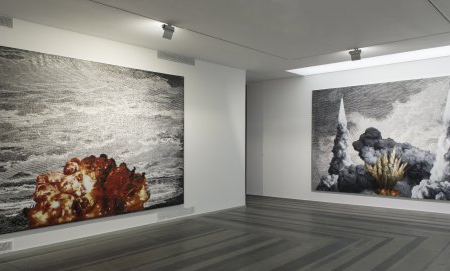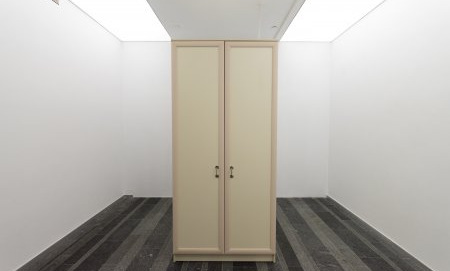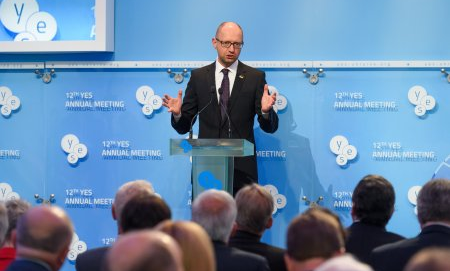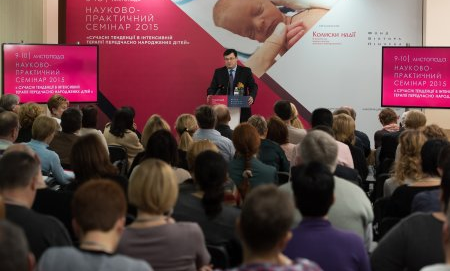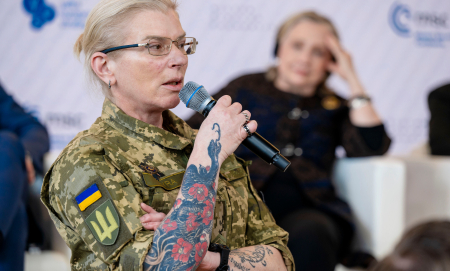News
Volodymyr Zelensky, President of Ukraine, tells Davos Ukrainian Breakfast, organized by Victor Pinchuk Foundation, “Continued global support gives me boundless energy to finish this war”
On May 25, 2022 in Davos (Switzerland), the Victor Pinchuk Foundation, and international investment advisory group EastOne, hosted the Ukrainian Breakfast Discussion, their traditional private event organized on the occasion of the Annual Meeting of the World Economic Forum (WEF). The discussion focused on what is at stake in Ukraine, and what international partners can do to support Kyiv amidst Russia’s war in Ukraine. Where is the war going, what steps must be taken now, and what is the strategic perspective for the future of Ukraine, Europe and the world?
Ukrainian President Volodymyr Zelenskyy addressed the audience via video link. Fareed Zakaria, host of Fareed Zakaria GPS on CNN, moderated the discussion. Among the speakers were President of the European Parliament Roberta Metsola; Latvian President Egils Levits; Ukrainian Foreign Minister Dmytro Kuleba; Editor-in-Chief of The Economist, Zanny Minton Beddoes; and Professor of History at Yale University, Timothy Snyder. Andrew Forrest, Founder and Chairman of Fortescue Metals Group; David Rubenstein, Co-Founder and Co-Chairman of the Carlyle Group; Jared Cohen, Founder and Chief Executive Officer of Jigsaw, Oleg Rogynskyy, CEO & Co-Founder People.ai; and Natalie Jaresko, Minister of Finance (2014-2016), Distinguished Non-Resident Scholar Atlantic Council, contributed to the discussion.
Opening the event, businessman and philanthropist Victor Pinchuk said: “This year, it is a Ukrainian Annual Meeting of the World Economic Forum because the world admires how bravely Ukrainians fight to defend freedom. I have a dream – that in a few years, just as this year, the World Economic Forum Davos will be Ukrainian again. At that time, after our victory, Ukrainians will have built a new Ukraine. We will not ‘rebuild’, we will build Ukraine 2.0 and 3.0. We will build a new economy, a new future, a new model for a modern European country, and for that reason, the World Economic Forum’s Annual Meeting in Davos will be Ukrainian again, because people will admire what Ukrainians are building.”
Ukrainian President Volodymyr Zelenskyy said: “Today, we are talking about the war for independence, for the freedom of a united Ukraine. I believe that this victory we are striving for is only the beginning.” He suggested that victory in the full-blown war that Russia unleashed against Ukraine on 24 February depends both on Russia’s will to end the war and on the willingness of the united West “not to be afraid but to fight against the Russian Federation in this war - not with boots on the ground, of course, but in various other alternative ways.”
Answering on what Kyiv will accept as a victory in this war, the President said: “When Ukraine says it is fighting to regain its territories, it means that Ukraine will fight until it restores all of its territory. It doesn’t mean anything else. It's about our sovereignty, our territorial integrity and our independence. And this state of ‘hot’ hostilities, of bloody war, can only move into diplomatic negotiations with the authentic participation of the Russian and Ukrainian presidents, supported by our strategic partners, when we see that the Russian Federation shows real willingness and desire to move from bloody war to diplomacy. This will be possible only when Russia concedes at least something, such as pulling back troops to the borders as they were on February 24.”
Timothy Snyder talked about Ukraine’s history as a European country, demonstrating the parallels between the history of Ukraine and the rest of Europe, until, as he pointed out, the country was subjected to the imperial ambitions of two autocratic states at the same time in the mid-20th century, a period during which he said Ukraine was the most dangerous place in the world to live. He expressed gratitude to the Ukrainian people for their courage in fighting for universal democratic values: “Referencing Paul Reynaud’s belief that a nation is what its people do every day, he said there is no nation in the world that so clearly exists right now as a nation as the Ukrainian nation. The rest of us should be learning from the example from Ukrainians, what it means to be a nation.
We see Ukraine now, because Ukraine is fighting and winning this war. But that’s too high a standard. No-one should have to be invaded by Russia for us to see them, no-one should have to resist Russia for us to see them. But now we have a chance to see Ukraine for what it is - a normal European country, which has been subject to an extraordinary degree of suffering.”
Zanny Minton Beddoes majored on the threat of a global food crisis, saying: “The food crisis will be a wake-up call and it is not just about Europe. We are gradually realizing the magnitude of the catastrophe that lies ahead. Ukraine is the breadbasket of Europe, together with Russia it supplies 30% of the traded wheat in the world.” She said our highest priority must be to unblock the seaport at Odesa, from where grain is supplied to the rest of the world: “Unless this harvest goes out, there is going to be a catastrophe in multiple parts of the world, Ukraine supplies calories for 400 million people globally.”
Commenting on the prospect of Russia’s raising the blockade of the Black Sea ports with help from Ukraine’s international partners, Dmytro Kuleba expressed doubts: “If NATO was not brave enough to close the Ukrainian sky during the most tragic moments of the war, why do we think they will close the Black Sea to allow the free passage of vessels transporting Ukrainian agricultural products. I would wholeheartedly welcome this decision, but I just don’t see the stamina and bravery necessary to take all the risks associated with such an operation.”
The Ukrainian foreign minister also called for the world to completely stop trade with Russia, to place a full embargo on Russian energy supplies and the imports of Russian goods, he said: “The concept of sanctions against Russia should be very simple - kill Russian exports, whether it is gas or oil or whether it is anything else that they sell to the world.”
Taking the floor, Roberta Metsola spoke about the likelihood of Ukraine becoming a member of the EU: “I definitely think Ukraine should be a candidate country for the European Union. Having been a citizen of a country trying to join the EU I understand the desire to join a union of countries that share the same fundamental values and principles that Ukraine is fighting for. Why would Europe not open its doors wide open? Why spend decades hiding behind legalities, when it’s simply a question of political will.”
Egils Levits provided insight into Russia’s psychology, saying: “The West fundamentally misunderstands Russia. Russia is not provoked by strength; Russia is provoked by the weakness of the other side. If it sees that the other side is weak, it goes further and becomes more aggressive. Consequently, the West, Europe and NATO should be strong and make it clear to Russia that we will use our strengths - the policy of deterrence of Russia and in the end, the policy of peace. Weakness of the West provokes war.”
Jared Cohen, called upon to give his opinion on the cyber-war waged by Russia, vowed that Jigsaw and Google would keep providing Ukraine with all necessary means to win in that theatre, and supporting Ukraine beyond the end of the war. He opined: “The feared Russian cyber skills have been shown to be below par, with soldiers taking their own phones into battle, or buying Ukrainian SIMS. Ukraine by contrast, has shown that its cyber-security is world leading, the country is simply the most battle-tested of any in this space. The best way to defend Europe and the world is to defend Ukraine.”
Andrew Forrest called for setting up an international investment group for Ukraine as soon as the war ends, offered to lead the effort and projected that a public call for funds could raise around 100 billion dollars. He also expressed deep concern about the looming food crisis and stressed that it is Vladimir Putin who is blocking food supplies from Ukraine from leaving the Black Sea. He called on Putin to end the blockade, make an unselfish decision and prevent millions of people from starving, saying: “We have a food crisis that will overwhelm the energy crisis heading our way.”
David Rubenstein said: “The West flinched when we were in the dark history of the 1930s. We now stand again in the dark of history. And the West should not be allowed to flinch again. We need to recognize and to learn the lessons of history. When someone wants to take some land, they will not stop there, they will want more land. Putin will want to do this again and again, and the result will be the horrors that we saw in WWII magnified.”
Leaders from politics, business, civil society and the media from Ukraine and the world attended the event, among them: Carl Bildt, Minister for Foreign Affairs of Sweden (2006-2014) and Prime Minister of Sweden (1991-1994); Mykhailo Fedorov, Vice Prime Minister — Minister of Digital Transformation of Ukraine; John E. Herbst, Director, Eurasia Center, Atlantic Council; Wolfgang Ischinger, President, Munich Security Conference Foundation Council; Chairman, Munich Security Conference (2008-2022), member of the Board of YES; Kersti Kaljulaid, President of Estonia (2016-2021), United Nations Secretary-General's Global Advocate for Every Woman Every Child; Alar Karis, President of Estonia; Vitaliy Klitschko, Mayor of Kyiv; Vladimir Klitschko, Founder Klitschko Ventures; Aleksander Kwasniewski, President of Poland (1995–2005), Chairman of the Board of YES; and Vladyslav Rashkovan, Deputy Director, International Monetary Fund, Ukraine.
The Ukrainian Breakfast (Lunch) at Davos has been held annually since 2005 to put Ukraine on the international agenda and bring Ukrainian and international leaders together.
In addition to the traditional Ukrainian Breakfast Discussion, the foundation also co-created and hosted the Russian War Crimes House (May 22-26, Promenade, 68) and the Ukraine House Davos (May 23-25, 2022, at Promenade, 63).
Partners of the Ukrainian Breakfast Discussion 2022:
- Kyivstar
- Horizon
- Western NIS Enterprise Fund (WNISEF)













